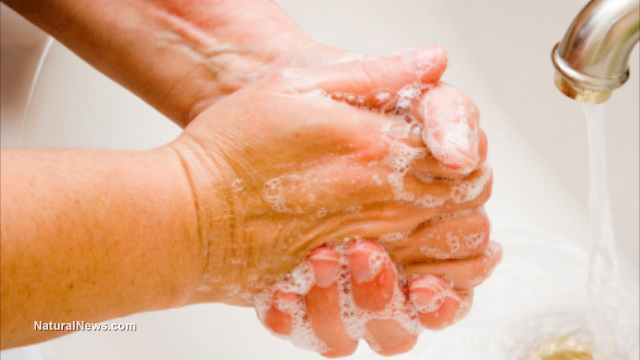FDA finally admits antibacterial soap ingredients are unsafe - and ineffectiveThursday, September 08, 2016 by: Isabelle Z.

(NaturalNews) The FDA has finally admitted what
Natural News has been telling you for
at least a decade: The ingredients found in antibacterial soaps are not only unsafe, they're also ineffective.
After studying the issue for several years, the FDA has stated that there is not enough evidence to prove that these products perform any better than tried-and-tested soap and water when it comes to preventing illnesses and killing germs. In particular, the chemicals triclosan and triclocarban have not been proven to be safe with sustained use. Triclosan is used in around 93 percent of all products that claim to be "antibacterial," and is known for its ability to break bacteria cell walls down over several hours.
The FDA will now bar the marketing of antiseptic soaps that contain one of 19 active ingredients identified as being questionable,
including triclosan. All of the products that contain these ingredients must either be removed from the market or reformulated to exclude them within a year. Three other chemicals are also being analyzed to determine their efficacy and safety, and could also find themselves part of the ban.
Hand wipes and hand sanitizers are off the hook for now, but the FDA told manufacturers in June that they need to prove that their active ingredients are
safe and effective.
A representative of the FDA's Division of Nonprescription Drug Products, Theresa M. Michele, said: "There's no data demonstrating that these drugs provide additional protection from diseases and infections. Using these products might give people a false sense of security."
Well-meaning individuals concerned about germs often purchase these products without realizing that the
FDA has never granted them safety approval.
The potential health issues you could be facing by using such products include severe hormone disruption, several types of cancer and even brain damage. Triclosan has also been linked to low levels of testosterone and thyroid hormone, leading to learning disabilities and infertility.
In addition,
triclosan can harm the environment, and is one of the most commonly detected chemicals in American waterways. Moreover, triclosan and triclocarban have been shown to
foster the growth of drug-resistant bacteria (superbugs). With so many drawbacks, washing your hands with "just" soap and water suddenly sounds a lot less risky.
Nature provides us with safer antibacterial ingredients
While soap and water is indeed more than sufficient for regular hand washing purposes, and has kept people relatively safe from most germs in everyday life for many years, there are still occasions where some people feel an extra layer of protection is required. Thankfully, there are
several good natural alternatives to these horrible chemicals that have antibacterial qualities. For example, many
essential oils contain organisms that can fight bacteria very effectively, while some even double as anti-fungal agents. Lavender essential oil can be used topically to kill bacteria, although it needs to be diluted in a carrier oil because its effect is so strong.
These chemicals can still be found in other types of products
While this ban is certainly good news for people's health and safety, it's important to keep in mind that these unsafe ingredients can still be found in countless other personal care products, such as toothpastes, deodorants, detergents and cosmetics.
One product that has been getting a lot of negative attention for its inclusion of
triclosan is Colgate Total toothpaste, which is touted as being "the only toothpaste approved by the FDA to help fight plaque and gingivitis."
When the toothpaste comes into contact with tap water the triclosan reacts with the chlorine to become chloroform. Rinsing won't solve the problem, as research has shown
it can stay in your mouth for as long as 12 hours. The chloroform levels are low, but they can add up over time. It's unclear whether the FDA plans to revise its stance on this product.
